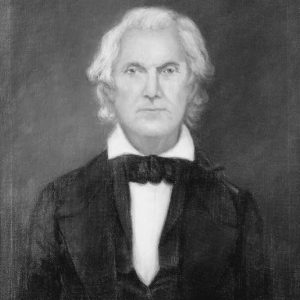calsfoundation@cals.org
Scott-Selden Duel
aka: Selden-Scott Duel
The Scott-Selden Duel was fought on May 26, 1824, between Andrew Horatio Scott and Joseph Selden, both judges of the territorial Superior Court of the Arkansas Territory. Judges Scott and Selden worked together on the Superior Court from 1821 until the duel, which resulted in Selden’s death.
Arkansas was created as a separate territory from Missouri in 1819. Congress vested the judicial power of the territorial government in a Superior Court, consisting of three judges appointed by the president for four-year terms, and in such other inferior courts as the territorial legislature might create. In 1819, Andrew Scott, Charles Jouett of Michigan, and Robert Letcher of Kentucky were appointed to be the first judges of the Superior Court. Jouett and Letcher left the territory before the first term of the court convened on January 19, 1820. Joseph Selden and Robert Johnson were appointed to replace them.
Andrew Scott was born in Virginia on August 6, 1789. In 1808, his family moved to Ste. Genevieve in present-day Missouri. Scott served as the first clerk of the House of Representatives of Missouri Territory, serving two terms. In 1819, Territorial Governor William Clark commissioned him sheriff of Jefferson County, Missouri. On March 3, 1819, President James Monroe appointed Scott as a Superior Court judge for the newly created Territory of Arkansas.
Joseph Selden was born in Henrico County, Virginia, on May 7, 1787. After his service in the War of 1812, Selden remained in the U.S. Army with the Regiment of Riflemen headquartered in Fort Belle Fontaine in the Missouri Territory. In May 1820, he was appointed a Superior Court judge of the new Arkansas territory to replace Robert Letcher. Judge Selden began service on the Superior Court with its October 1821 term along with Judge Scott and Benjamin Johnson of Kentucky, who had replaced Judge Jouett in June 1821.
The duel arose over an alleged insult by Selden to Scott’s card partner (a lady friend) during a game of whist played at Arkansas Post in April 1824. Scott demanded an apology, which Selden refused. According to William F. Pope’s account, Scott then seized a candlestick and hurled it at Selden. Bystanders intervened and prevented further violence. After a few days, Selden sent a letter of apology to the lady, which was accepted, and the matter was thought to be settled. However, later in April, the quarrel was revived, and Scott challenged Selden to a duel.
The duel took place on May 26, 1824, on the eastern side of the Mississippi River, opposite Helena (Phillips County), since dueling was a crime under Arkansas territorial law. Judge James Woodson Bates acted as a second for Selden, and Dr. Nimrod Menifee acted as surgeon and second for Scott. The weapons were pistols. Judge Selden was hit by the first round fired, and the bullet passed through his heart and lungs. Selden expired within minutes without uttering a word. Scott received no injury.
Scott survived an attempt in 1824 to remove him from office for participating in the duel. He served the remainder of his term, until 1827. However, after being reappointed by the president, he failed to gain Senate confirmation on account of a committee report citing his involvement in the unlawful and fatal duel.
Joseph Selden was survived by his pregnant widow, Harriett, and a one-year-old daughter, Elizabeth, who had been born in Little Rock (Pulaski County) in 1823. Within months of the duel, Harriett and Elizabeth Selden had left Arkansas and returned to Virginia, where a second daughter, Josephine, was born.
For additional information:
Looney J. W. “Law on the Frontier: The Superior Court in the Arkansas Territory.” Arkansas Lawyer (Spring 1998): 22–27.
Pope, William, F. Early Days in Arkansas. Little Rock: Fredrick Allsopp, Publisher, 1895.
Sherwood, Diana. “The Code Duello in Arkansas.” Arkansas Historical Quarterly 6 (Summer 1947): 186–197.
White, Lonnie J. Politics on the Southwestern Frontier: Arkansas Territory, 1819–1836. Memphis: Memphis State University Press. 1964.
Ed Nelson
North Little Rock, Arkansas








Comments
No comments on this entry yet.